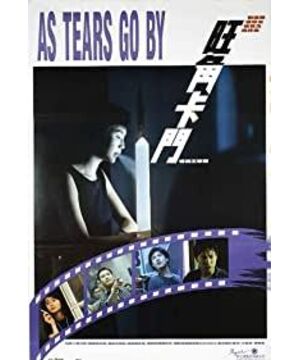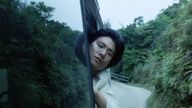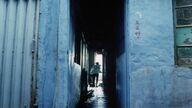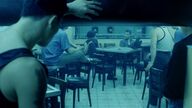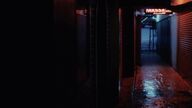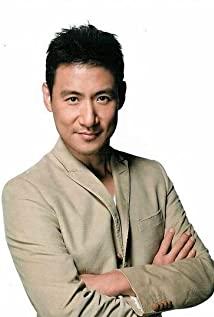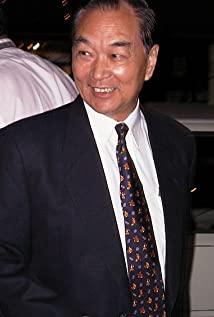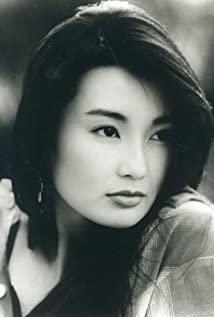"Mong Kok Carmen" (1988) is Wong Kar Wai's first work. Although Wong Kar-wai had been ups and downs in the film industry for many years before directing this film, "Mong Kok Carmen" does not have the catharsis of waiting for an opportunity due to depression for too long. Instead, it has a calm bearing, a kind of Compassionate gaze, and a helpless sigh. This makes the film overflow with a mournful mood, a calm observation of the impermanence of the fate of the underworld characters, and the tiredness of the battles in the rivers and lakes. Therefore, although it is a gangster film, the life of the protagonist in "Mong Kok Carmen" is not heroic, nor free and easy, but "involuntarily". Sleep in the rivers and lakes. Moreover, this slumber will not become a legend, but only a local news material, a little talk for the citizens after dinner. In Woo Yusen's "The True Color of Heroes" (1986), Brother Xiao Ma appeared uninhibited and dared to act. He said that what he had lost (status and dignity) must be brought back by himself. Brother Xiao Ma told Brother Hao in the temple that he didn't need to worship God, because he was a god, and the one who can control his own destiny is God. When the audience watches this kind of film, they can hide their fear of mediocrity and failure in life, and complete the comfort and compensation for the frustration in reality. However, "Carmen Mong Kok" did not reveal any pride. After the disenchantment, the underworld characters showed a mediocre and even useless side. Their so-called careers were too trivial and full of danger, which made their deaths no longer have a tragic meaning. , but rather meaningless and sad, telling the cruelty and nothingness of the underworld life. "Mong Kok Carmen" is not just content to tell a tense story like "The True Color of Heroes" and other gangster films, presenting action and scenes with audio-visual impact, but pays full attention to the use of lighting, scenery, color, camera movement, etc. , reflecting the pursuit of personalized film aesthetics. However, this is the first film directed by Wong Kar-wai after all, the art style is still in the groping stage, the editing is messy, and there are many places where the plot is random. The film tells a story with a realistic background in a space with a strong atmosphere of life. The audience will inevitably use the scale of realistic logic to judge the plot, and then find that some of the characters' behaviors have a serious sense of jumping and an unknown sense of rupture. This may be due to the film's attempt to fit the core of a literary film into the framework of a gangster film, occasionally immersing itself in sensitive and melancholy feelings of the world, thus producing the inevitable effect of rejection with the violent and turbulent external actions. Moreover, the characters in the film are seriously detached from the social and psychological dimensions, and become symbols that the director intends to carry the theme, although this expresses the loneliness, Alienation, separation between people, etc., have similarities with Wong Kar-wai's later films, but it is not the "right way" for film creation that requires the audience to rely on imagination and guesswork to understand the characters' psychological motives. In addition, when filming some action scenes, the film uses too many shaking lenses, high-speed photography (slow motion), and at the same time, there is a sense of incoherence caused by drawing frames. It is beyond the scope to unify these styles in one film. the imagination of most viewers. If you ignore the immaturity and deliberateness of the film, this is still a very "Wong Kar Wai" film, and the attention to many details is amazing. 1. Live in the moment: the living state of underworld characters, O Hua, the protagonist of "Carmen in Mong Kok", has a certain status and popularity in the underworld in Mong Kok, and even has his own business (a bar), and has a little brother Wufei. The film mainly shows the living state of the underworld characters through Ohua. The first shot of the film is the night scene of Mong Kok. In the foreground of the picture is a glass curtain wall glowing with blue light, which looks bright and prosperous, and in the background is a giant neon sign of a shopping mall. The crowd between these two conspicuous tall buildings is exactly the living situation of urbanites: living bleak but still prosperous in the squeeze of material. The film hits the credits in this fixed-camera long shot. At this time, the traffic flow on the street was turbulent, the crowd was surging, and the curtain wall seemed to be changing (Figure 1).
When the film officially started, it was an overhead panorama, and the sun shone on Ava, who was sleeping on the sofa. It can be said that Ahua's half-sleep and half-awake state at the beginning of the film echoes his "sleeping" on the street at the end of the film, which sums up the life of a gangster character: from half-sleep to complete sleep (from undisturbed sleepiness). to death). Afterwards, the phone call from "hometown" hinted at the fact that Ah Hua came to Mong Kok to work hard from the traditional community (Figure 2). Because, in a city like Mong Kok, which is highly urbanized and composed of a large number of immigrants, it is obvious that there will be no such human relations as "four aunts" and "second uncles".
At the beginning of the film, the simple and empty but sunny features of Ahua's room are presented. Of course, in most cases, day and sunshine have nothing to do with Ava's day-and-night life. Because he is an animal of the night, a marginal group of this society. After receiving the call from the fourth aunt, Ah Hua was about to go back to sleep when the doorbell rang. Ah Mo appeared, dressed in black, wearing a large mask and thick hair. After seeing Ah Hua, he took off the mask and introduced himself. Ah Hua was a little stunned, surprised by the unexpected visitor and probably by the beauty of his cousin. After Ah Hua introduced Ah Mo into the house, he continued to fall asleep. It can be inferred from the warmer tones that the time has moved from morning to evening (Figure 3).
After a violent cough, Ah Mo went to the kitchen to look for water to take medicine, but to no avail, it gave the audience a glimpse of Ah Hua's chaotic living conditions: the kitchen was messy, apparently seldom cooking; There is a pool of bowls to wash; there is not a full cup in the house. Ah Mo finally found a glass bottle suspected of containing water in the refrigerator, but after taking a sip, he knew it was wine. As night falls, in a close-up, Ava lights a cigarette. The red cigarette butts were so faint in the darkness, yet so conspicuous. At this point, the room has changed from sunny to dark and blurred, with cool tones (Figure 4).
The picture cuts to the restaurant where Wufly collects debts, which is pale because the fluorescent lights are turned on. Fei Jiu obviously didn't take black flies in his eyes. Soon Ah Hua came in and frightened Fei Jiu in a fierce way. In this scene, the way of doing things in the arena is introduced, which is to fight the brave and beat the ruthless, bully the weak, and you will die. The black fly is obviously too immature, and has not yet acquired the true meaning of the rivers and lakes. The next scene is the "FUTURE" nightclub, with red signs and blue lights, rendering it mysterious, dark and full of temptation. Ah Hua comes to find his girlfriend Mabel who has been in love for 6 years. But his girlfriend was desperate for him: no money, no future, not enough thoughtfulness, and even the money for her abortion was borrowed from her mother. Ah Hua said to his girlfriend, you know who I am, if you want to get married, if you want to be rich, don't be with me (Picture 5).
This again reveals the living and emotional states of the underworld characters: wandering without support, changing, and bleak prospects. Because of lovelorn, Ah Hua got drunk and went home. It was already late at night. The room was dark, with blue light everywhere, looking bleak and melancholy. Ah Hua smashed the things at home for a while, Ah Mo was terrified, because he accidentally said the word "lost love", Ah Hua was furious. The next morning, when the sun shone into the room, Ah Hua actually got up with a splitting headache. Apparently, "Lovelorn" disrupted Ohua's biological clock, which made him somewhat uncomfortable starting in the morning. At sunset, the golden sunlight paints a layer of warmth and poetry in the room, and Ah Mo's face appears serene and peaceful. Ah Hua invites Ah Mo to watch a movie, but Ah Ge refuses on the surface, but carefully spit off a little dirt on the skirt, and his thoughts are fully revealed in this detail. This scene is also a rare warm and calm moment in the film. The picture cuts to a billiard room, which is dark and low, cramped and mysterious, full of unease and danger. Wu Fei lost in gambling with people here, and was unable to pay. Wu Fei and his younger brother Asi used relatively smooth mobile photography when running in the billiard room. After the two escaped to the street, they began to use shaking photography, showing a kind of anxiety and tension. The black flies were beaten out of shape, and the street was filled with indifferent onlookers. Wufei suddenly broke into Ah Hua's house, breaking the tacit understanding and peace between Ah Hua and Ah Mo. In high-speed photography, Ah Hua leaves home to avenge the black fly. In a side-lit close-up, Ohua's face is grim, half shrouded in shadow, with a red sky behind him (Figure 6),
Bloody means strong. In a restaurant, the gang of people who beat the black flies were drinking, and the film used high-speed photography, and the scene was pale. A fierce battle unfolded, and Ah Hua fought against the opponent alone, and controlled the situation with tenacity and ferocity. When Ah Hua swung a sharp knife at the boss of the pool room, the boss also picked up a kitchen knife from the chopping board and slashed at Ah Hua. From the boss's point of view, he could reasonably hit Ah Hua with one knife, but after a jump, Ah Hua and the boss switched positions, and the one who wielded the knife became Ah Hua, hitting the boss's chest. This jumping axis should be an intentional hint of the director, that is, a person like Ahua will die in a fight at any time. This time he escaped, only the director used the jumping axis to save him for the needs of the plot development ( Figure 7, Figure 8).
It was another fine morning, and Ah Hua was still asleep. Ah Mo had left a letter and told Ah Hua that she had bought a few cups and hid one, and she would tell him when he wanted it. At this time, insert an empty shot, and in a low-angle perspective, two buses pass by in the suburbs. In the green, the red and yellow buses are particularly conspicuous, and the meaning of "missing" is also more eye-catching (Figure 9).
In this "missed" shot, it not only hints at the ending of Ah Hua and Ah Mo's love, but also expresses the contradictory mood of the two protagonists. Two cars, one to Mong Kok and one to Lantau Island, is very meaningful in itself. ——In the hustle and bustle of Mong Kok, Ah Hua will yearn for the tranquility of Lantau Island at some point; Ah Mo, who is trapped in the closed and boring Lantau Island, will also yearn for the life full of opportunities and changes in Mong Kok. At this time, the film inserted another aerial shot from overhead, aiming at a green treetop, and the green color filled the whole picture. This is a picture full of vitality, and it is also the poetic and tranquility that cannot be found in a reinforced concrete city like Mong Kok. After a drop shot, the camera captured Ah Mo sitting at the table in a daze. Her gaze is upward, seemingly aimless, but thoughtfully, the camera continues to move, and it becomes the middle shot of Ah Mo, who is holding a paper plane in her hand. As Ah Mo threw the paper plane and cut it to Mong Kok, a real airliner was flying in the night sky in the dark blue. The camera is reversed, presenting the plane as Ava's point of view. The film connects the two people's minds vaguely through such a lens connection.
In "Carmen Mong Kok", the living conditions of the underworld characters are like this, day and night, chaos and randomness, but they are full of murderous intentions. The sunny day seldom belongs to these underworld characters, but the cool-colored rooms, pale restaurants, dark and mysterious nightclubs, and dim billiard rooms are the main places for their activities. The rooftop where Asi got married perfectly condenses the social situation of these underworld figures: it is like broad daylight, open and open, but it is a place that ordinary people will not visit. Therefore, it is delusional to want to witness the happiness, tranquility, and a better future that ordinary people are looking for in these underworld figures. They only live in the moment. As Ah Hua said, "We never know what tomorrow will be like." They can only care about One night of joy and one night of sleep. 2. Scarcity and Search: The Emotional State of Underworld Characters It can be learned from some details in the film that Ah Hua is from Lantau Island. He came to Mong Kok to survive when he was a child, and started killing people at the age of 14 (with family expenses). Judging from Ah Hua's lack of English, his education is limited, which reflects the fact that he comes from a handicapped family. Looking at Wufei again, after receiving the settlement fee, in addition to giving Asi a little compensation, he also bought an air conditioner to give to his mother, but when he arrived at Tiaojingling (a famous shanty town in Hong Kong, this shows that Wufei is poor and poor. origin), but my mother didn't want to see him, let alone his air conditioner, and obviously found another man. Therefore, the two underworld characters, Ahua and Wufei, both come from poor and even handicapped families. They came to the city from the slums to work hard, and it seems that they will inevitably embark on the underworld. The danger and turmoil of the underworld, the absence of family affection, and the instability of love make it seem that only friendship is something they can rely on in their lives. It is understandable that Wu Fei is so unsatisfactory, Ahua still protects him everywhere, and even uses his life to fulfill Wu Fei's wish. Because Wu Fei may be the only person Ah Hua cares about in the world (and later Ah Mo). The fraternal friendship between Ahua and Wufei is their only comfort and warmth in the cold world. Judging from the relationship between Ah Hua and his girlfriend Mabel, these underworld characters have no emotional stability, no commitment, and no future. Therefore, the girlfriend can only leave Ah Hua with a whole body of pain in the end. Judging from the time A Mo and A Hua spent together, it seems that there are only worries and fears, as well as ubiquitous parting and pain with the underworld characters. Ah Hua also knows that his living state is not suitable for sincere love, so he only makes cautious promises to Ah Mo. Originally, Ah Mo and the doctor from Lantau Island could have peaceful happiness, but the unexpected arrival of his cousin made everything overturn. Perhaps, in Ah Mo's eyes, the doctor and his cousin represent two emotional dimensions: the doctor represents the peace, tranquility and simplicity of the village style (Lantau Island), but correspondingly lacks vitality and change, and is easy to be conservative, closed, and stagnant; The underworld figures based in Mong Kok, although their lives are turbulent, full of danger, and have a bleak future, they radiate a kind of vitality unique to the city, a kind of excitement and romance generated by constant changes, representing openness, enterprising, bloody masculinity , as well as the heroism of "iron shoulders shouldering morality", the freedom and ease of daring to act, the independence and mystery beyond the mundane. Obviously, Ah Mo has beautified Ah Hua to a certain extent, and painted Ah Hua's career and life with a "chivalrous" pride, but he lacks the corresponding mental preparation for the instability in his life. However, Mong Kok and Ah Hua have an inexplicable temptation to Ah Mo, and Ah Mo can no longer endure the secluded tranquility of Lantau Island. It was on Ah Mo that we discovered the film An astute capture of life's dilemma: We always find hopelessly that the real life lies elsewhere. On a rainy day, Ah Hua ran into his ex-girlfriend Mabel, who was married and pregnant. This made Ah Hua somewhat lost. He seemed to suddenly realize the vacancy in his life, and instantly felt a strong loneliness and a desire for emotional comfort. At this time, the film makes two people stand on both sides of a pillar, which is an image of blocking (Figure 10).
Ah Hua's melancholy could not be relieved. He dropped a coin in a bar and listened to "Passion" from the jukebox. The singing sounded like his thoughts. In a rising shot, there is a close-up of Ah Hua, he is lost in thought, and a bus is speeding towards Lantau Island. The streets of Lantau Island are deserted and dark. There is no bustling and hustle and bustle as bright as day in Mong Kok, but there is a calmness away from the hustle and bustle. Ah Hua and Ah Mo met in front of the pier. Before leaving, Ah Hua told Ah Ye that he had found the cup she had hidden. Ah Hua threw the cup away on the boat, as if he had a wish. At this time, Ah Mo called Ah Hua and told him to wait for her at Mui Wo Pier. Ah Mo chased her all the way to Mui Wo Pier. When she got off the bus, her background was all red, which was not only a symbol of passion, but also an ominous warning. Ah Hua grabbed her hand from behind her, and the two ran to the phone booth, shaking the camera again, and using high-speed photography to magnify the passion and romance. The two kissed each other in the phone booth, the voice-over singing also reached a climax, and the picture gradually became overexposed, as if being burned by passion, and finally turned into a blank (Figure 11).
Ah Mo asked Ah Hua why he came to her now, Ah Hua said, "Because I know my own affairs. I can't promise you anything. If I didn't miss you, I wouldn't come to you." Maybe, this A mo, who is deeply immersed in a regular life, is very fascinated by her prodigal recklessness. She hesitates and walks into A Hua's room, choosing passion and instability. In a day scene of Lantau Island, Ah Hua and Ah Mo walked intimately together. Ah Mo wore a red cardigan and a short skirt for the first time in the film, looking youthful and beautiful (Figure 12).
A Mo said that she didn't want to do it here, she wanted to go to Kowloon to find a job, and she would not come back after going out. This is the sadness of the characters in the film, and the sadness of their love. Ah Mo didn't know, it was precisely because she was soaked in the simple and simple atmosphere from Lantau Island, which made Ah Hua, who lived in the restless air of Mong Kok, like a spring breeze, which made Ah Hua feel lost after meeting her. When Ah Mo arrives in Mong Kok, she will lose this "scent of soil", become a numb and indifferent city person, and will see the mortal background behind Ah Hua's mysterious veil. In other words, when Ah Mo escaped from the calm and stagnant Lantau Island, he soon became tired of the turmoil in Mong Kok. As the entanglement between Wu Fei and Tony intensified, Ah Hua saved Wu Fei and had a head-on conflict with Tony's group, and was beaten inhumanly by the other side. In the hotel on Lantau Island, Ah Hua reassured Ah Mo not to worry, it was just a skin injury, Ah Mo said what about next time? Ah Hua said, "I never think about the next time when I do things. Except for one thing, the next time I go out of Hong Kong, I want you to go out with me." They are all mountains with street light poles (medium shot, flat angle), and the third is a close-up shot of treetops (overhead shot). If the third shot represents a yearning for serenity and happiness far away from the hustle and bustle, the first two shots mean that the serenity away from the hustle and bustle does not exist (street light poles symbolize the industrial civilization's interest in "nature" and "quiet"). shock). In other words, the paradise that Ahua wants to pursue away from the grievances and grievances of the rivers and lakes does not exist. After these three shots, there is a close-up picture of Ah Hua and Ah Mo sleeping naked together, but at this time the CALL machine rang, and the troubles of the world finally invaded Ah Hua's two-person world. Axi told Ahua Wufei the fact that he had received settlement fees. Ahua decided to go back by bus. When the bus drove past, the blood red color of the body filled the whole picture, which was an ominous omen. When the bus passed Ah Mo, it was blood red again (there is another place in the video where this ominous red color appeared. After Ah Hua arrived in Mong Kok, he replied to Ah Mo's CALL machine, and after hearing Ah Mo's concern and concern, he Depressed, but still wearing sunglasses, he walked firmly across the street. At this time, a bus passed by and filled the picture with red). In the close-up view of Ah Mo, the audience can clearly see the changes in her mood: sadness in peace, tears in sadness, sorrow and sorrow, and leaving with a sigh (Figure 13). ——Underworld characters can't control their own destiny and emotions, how can she pin their emotions on them?
When Ah Hua was healing on Lantau Island, the life in Mong Kok was shown again with the first shot at the beginning of the film. It was still the splendid curtain wall and the busy traffic under the curtain wall. In a panning shot, the film shows us the real life inside the curtain wall. Here is a nightclub, with light and shadow floating, and a vulgarly dressed girl is singing superficial love. The camera is pushed past the singer, A Gong is encouraging Yinzai to kill Dakouji. Here, the trajectory of the camera movement is from the curtain wall on the street to the narrow space where Grandpa and Yinzai talk, there is a process from bright to gradually dark, from empty to gradually cramped. This is the truth behind the prosperous appearance of Mong Kok revealed to the audience by the film: flamboyant, empty and hypocritical, forced to laugh, intoxicated with money, and murderous. In these underworld characters, family affection is absent, and the cruel and turbulent life makes them not have much tenderness, so they hardly encounter the love that touches the soul. Like the love between Ah Hua and Mabel, it is more like a way of warming each other between two lonely and empty people. The two broke up after being in love for 6 years. For Ah Hua, it was just a hangover. . After meeting Ah Mo, because of the serenity of time and space, because of the nostalgia for a glimpse, and because of the sharp feeling after the emptiness of life, Ah Hua realized that this time it was no longer a play, but a kind of Sincere emotional desire. But, for friendship (loyalty), he finally gave up love. Perhaps, friendship (loyalty) is the foundation of Ah Hua and the others, but in fact, there are too many intrigues in the bloody rivers and lakes. It is rare for Ahua to take care of Wufei like an elder brother, so Tony, Grandpa and others find it unreasonable, but they will not understand that the friendship with Wufei is the only emotion that Ahua can cherish in the wandering rivers and lakes. Fragments. 3. Bloody Streets: The Fate and Ending of Underworld Characters The fate of these underworld characters of Ahua has been seen in the jumping shot, and there is also a hint in the scene where Ahua is comatose at the beginning of the film. In fact, these underworld figures have long predicted their own destiny, so they "live in the moment" and are unwilling to make any promises to themselves and others. Facing the fate of bloodshed on the streets, Asi is a brave retreat, so he can get a hard but peaceful life, but for most gangsters, they have been unable to adapt to the mundane world of ordinary citizens, and they would rather be in the storms of the rivers and lakes. Live at your own pace in life, and enjoy a life that is dangerous but arbitrary, borderline but reckless. Since the family love is gone, the normal love does not dare to be extravagant, and the friendship is unattainable. There are not many important things in their lives, and even their lives have been handed over to luck, so what is the meaning of their existence? What kind of faith do they rely on to support their fateful death? Judging from the experiences of Ahua, Wufei, Tony and others, dignity is their belief, and loyalty is their foundation. Wufei has spent his entire life struggling for dignity. He was extremely angry about selling fish balls on the street. He even felt that it would be detrimental to his identity to run away in a fish ball cart when the chengguan came. In the end, he accepts the task of killing Dakouji in order to gain the respect of others and enhance his own value in life. After getting the settlement fee, Wu Fei went to Asi and gave Asi a stack of money, saying that it was because he had wronged him for Asi's marriage last time when the wine was placed on the rooftop. The money put a full moon wine for his son. Wufei said to Asi that many people used to underestimate him, "but after two days, if you read the newspaper and watch TV, you will know that your boss Wufei is not a useless person. ... Remember, you tell others that you have a Very powerful boss." After speaking, Wu Fei retreated to the right side of the screen, flashed away erratically, and disappeared from Asi's life like a ghost. In a subsequent medium shot, Asi and Wufei are separated on both sides of a telephone pole, as if the two worlds of Yin and Yang are separated (Figure 14).
In contrast, although Tony has been living a free and easy life and calling for wind and rain, he is still scared in the face of the black fly who has already advanced his life, and begged for mercy with a crying voice.
Wu Fei said to Tony's subordinates, "What's the use of wearing a suit and tie with a big brother's phone? Follow such a big brother!" For Wu Fei, being able to humiliate Tony was far more enjoyable than killing Tony. And for Tony, although he saved his life by begging for mercy and being humble, he was dead as a big underworld brother because he had no dignity. Sure enough, after Wu Fei left with a mad laugh, Tony was both hated and angry, so he had to force a laugh and give the money to his subordinates, but his subordinates threw the money away, slapped the big brother's phone on the table, and led the crowd away. . Ahua doesn't agree with Wufei's pursuit of dignity regardless of life and death. He used himself as an example to persuade, "I paid family expenses when I was 14 years old. I used to be majestic, so what? Isn't it like this now?" Ahua also tried to shake Wufei The outlook on life, "Don't think that you will be prestige after you finish this thing. When you finish it today, everyone will say that you are fierce enough. Next week, someone will know who you are. But so what? Later, no one will know you Wufei!" But Wufei thinks that Ah Hua has at least once been powerful, and no one can look down on him, "I would rather be a hero for a day than be a Wufei for a lifetime." Put the ending at the door of the police station, at that time, the police were transferring Dakouji. The black fly was leaning against a police car with an orange drapery behind it. In high-speed photography, the music is hidden, only the footsteps are kept, and the shaking photography is used to create a kind of anxiety. The tension grows after the camera cuts between Dakouji and Wufei a few times. Wufei throws away the peanut shell on his hand, a close-up of the fall, and the trajectory of the fall can be seen almost clearly in slow motion. In the chaos, Wu Fei drew his gun and shot furiously. The police reacted, pulled their guns and returned fire, the black fly was shot, and the orange curtain behind him seemed to conjure his soul. Still in slow motion, the struggle of the black fly being shot is soothingly displayed. In a close-up, Wufei's gun fell, and he also fell, with infinite reluctance and unwillingness in his eyes, the music sounded like a sigh of compassion, and blood was spitting out of Wufei's mouth (Figure 15).
Ahua witnessed this scene, and at this moment, a bright red container car drove past behind him. Still high-speed photography and shaking the camera, Ahua kicked the police officer, shot Dakouji in the chest, and a policeman shot Ahua in the head. Ah Hua shook his head, flashing back to the scene of him and Ah Mo kissing passionately in the phone booth. In an overhead shot, Ah Hua fell to the ground, his eyes widened angrily, but his eyes were empty. In this expression similar to "Tianwen", there is Ah Hua's nostalgia for life, and there is also regret for unfinished love and career (Figure 16).
It is worth noting that the number of shots fired and shot by Wu Fei and Ahua was obviously subjectively processed: it is hard to imagine that at the gate of the heavily guarded police station, in the process of transferring important stained witnesses with high vigilance, Will turn a blind eye to the appearance of the black fly, and will wait until the black fly has fired all the bullets in the pistol before reacting. Perhaps, considering that Wu Fei has never been majestic in his life, and has never done a grand event, the film deliberately allowed him to complete a splendid bloom at the last moment of his life, and let him shoot as much as he liked, wound Dakouji, Several police officers were killed and wounded, and he was shot several times before falling to the ground. That is to say, the film adds time to Wu Fei's final feat, prolonging his glorious moment and his attachment to such moments. But for Ah Hua's "complement number", the film did not appreciate it, so he made a subtraction. He was shot dead by the police before he had time to kill Dakouji. The whole process was short and nothing heroic. Indeed, "Man does not live according to his immediate needs and wishes, but in imaginary passions, in hopes and fears, hallucinations and awakenings, fantasies and dreams." [M].Beijing: Xiyuan Publishing House, 2004:39.) But from the perspective of Wufei's passion, hope, and dreams, his biggest goal is to gain the approval of others, to recognize his majesty, and to admire his courage and courage . However, Wufei will not know that his ideal of life is not derived from the desire of the soul, but is woven and shaped by the surrounding environment, and this weaving and shaping is even malicious. From Maslow's motivation theory, the ideal of a black fly is shallow, not the highest pursuit of life. Maslow believes that people have five needs: basic needs - physiological needs; security needs (desire for a safe, predictable, organized, orderly, lawful world); belonging and love needs (through contact, intimacy, Belonging to overcome alienation, loneliness, alienation); self-esteem needs (desire for self-confidence, independence, and freedom in the face of the world; desire for fame or prestige; for status, prestige, honor, dominance, recognition, attention, importance desires for sex, nobility or admiration, etc.); self-actualization needs (what a person can be, he must be, he must be true to his own nature). (Maslow. Motivation and Personality [M]. Beijing: Huaxia Publishing House, 1987: 40-59. ) Wufei set the highest value of his life as "self-esteem", that is, to gain respect or respect from others to prove his strength and achievements, he mistakenly thought this was "self-realization", but he didn't know, " Self-actualization can be subsumed as a person's desire for self-fulfillment and fulfillment, that is, a tendency to make it possible to realize one's potential. This tendency can be described as a person becoming more and more unique, to become what he can be. Everything.” (Maslow. Motivation and Personality [M]. Beijing: Huaxia Publishing House, 1987: 53.) Wufei never knows what his nature, talent, and potential are, but accepts the external environment for him Expectation (to be a powerful enough character), this is where he lives blindly. In Ava, we can see a "regression of needs". Ah Hua once also pursued "dignity", but after seeing through the nothingness of "dignity", he became aimless, and only after meeting Ah Mo did he yearn for "the need for belonging and love". In this way, although he cannot achieve "self-realization" by achieving the uniqueness and perfection of his life, in a sense, "the need for belonging and love" is at least a profound self-recognition of Ah Hua after the ups and downs of the rivers and lakes. , which is more subjective than Wufly's fanatical or even ignorant pursuit of "dignity". Therefore, for these underworld figures, it seems that there are only two things they need to care about in their lives: loyalty and dignity, and their lives will also end or be achieved in loyalty and dignity. After looking down on his own "dignity", Ah Hua sacrificed his life in order to fulfill the "dignity" of Wufei. This is the sad part of the underworld characters, they never know what the real value of life is; at the same time, this is also the sad part of the underworld characters, there are too few emotions in their lives that can be grasped. Perhaps, most of the underworld characters have "heroic feelings" and "knight-errant feelings", eager to move from the "edge" to the "center" and become the protagonists on TV and newspapers. For them, even being the center of attention in this "anti-social" way is a ray of light in a dark life. It's just that most of them end up bleeding on the streets. ——They live on the edge of the city and in the dark night, but they have to say goodbye to their lives in a public way. Perhaps, in their opinion, dying like this with vigour is far better than growing old alone in the mundane world. "There is no trace in the sky, but I have flown." Did they really "fly"? Their life trajectories are often so hasty, and they disappear into the night before they can emit a dazzling light. Has anyone really noticed the occasional parabola in the sky? ) Wufei never knew what his nature, talent, and potential were, but accepted the expectations of the external environment (to be a powerful and powerful character), which was where he lived blindly. In Ava, we can see a "regression of needs". Ah Hua once also pursued "dignity", but after seeing through the nothingness of "dignity", he became aimless, and only after meeting Ah Mo did he yearn for "the need for belonging and love". In this way, although he cannot achieve "self-realization" by achieving the uniqueness and perfection of his life, in a sense, "the need for belonging and love" is at least a profound self-recognition of Ah Hua after the ups and downs of the rivers and lakes. , which is more subjective than Wufly's fanatical or even ignorant pursuit of "dignity". Therefore, for these underworld figures, it seems that there are only two things they need to care about in their lives: loyalty and dignity, and their lives will also end or be achieved in loyalty and dignity. After looking down on his own "dignity", Ah Hua sacrificed his life in order to fulfill the "dignity" of Wufei. This is the sad part of the underworld characters, they never know what the real value of life is; at the same time, this is also the sad part of the underworld characters, there are too few emotions in their lives that can be grasped. Perhaps, most of the underworld figures have "heroic feelings" and "knight-errant feelings", eager to move from the "edge" to the "center" and become the protagonists on TV and newspapers. For them, even being the center of attention in this "anti-social" way is a ray of light in a dark life. It's just that most of them end up bleeding on the streets. ——They live on the edge of the city and in the dark night, but they have to say goodbye to their lives in a public way. Perhaps, in their opinion, dying like this with vigour is far better than growing old alone in the mundane world. "There is no trace in the sky, but I have flown." Did they really "fly"? Their life trajectories are often so hasty, and they disappear into the night before they can emit a dazzling light. Has anyone really noticed the occasional parabola in the sky?
View more about As Tears Go By reviews


